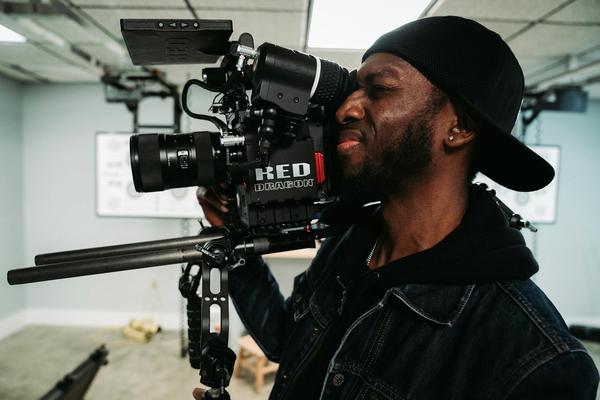
How to Create Your Own Filmmaker Portfolio

Jessica Michael
Published onStarting a career in film is challenging and exciting. It's a chance to express your creativity and share your vision with the world.
But in an industry that's highly competitive, how do you make sure your work rises above the noise?
Having a great filmmaker portfolio can help you land important opportunities and open the right doors. Whether you are applying for film school, developing a project portfolio, searching for a job in the film industry, or starting your own film production company, a well-done portfolio is a must to showcase your work and to be seen by the right people.
Why you need a filmmaker portfolio
A filmmaker portfolio is a great way to showcase your film clips, shorts, trailers, and resume. It makes it easy to share your work with potential clients and employers, or to organize your film school portfolio. Examples of why you need a filmmaker portfolio include:
Marketing your film production company
Tracking the development of a film project
Organizing your work samples from film school
Applying to film school or internship programs
Building an audience through social media and email marketing
Your portfolio is one of the best ways to extend your reach because it makes your work accessible and shareable by showcasing it in one place. Simply by sending a link, you can introduce someone to your films and projects.
It also gives you a platform to talk about case studies and projects, and to share your experience and work process. You can also list services, schedule consultations, and create an email capture to expand your email marketing list.
In addition, by linking your film portfolio in your social media bio and adding social media buttons to your portfolio, it can help you expand your social media presence and create a sense of professionalism.
How to make a film portfolio
In order to create an impressive filmmaker portfolio, you will first need to decide on which website builder you want to use.
A website builder is a platform that provides pre-built templates and themes so that you can build a website without having to code. They allow you to build a professional site that can be as simple or complex as you like in a short period of time.
A good website builder provides you with a variety of customization options to make your website work for you. It will also boast an easy-to-use editor that makes it simple to build and update your filmmaker portfolio website.
Many website builders have a tiered pricing system so you can pay for only the features that you want and need. Some, like Journo Portfolio, also have a free tier which lets you try out the platform to make sure it works for you.
What to look for in a web builder for a filmmaker portfolio
As a filmmaker, there are particular features you'll want to make sure are included by your web builder of choice.
Custom domain name. As you build your reputation and your brand as a filmmaker, you'll want to take advantage of name recognition. Being able to utilize a custom domain name helps you create instant recognition.
Video embedding. Some web builders don't allow video embedding, and as a filmmaker, you want to have your work front and center. Make sure the pricing tier you choose includes adequate video embedding minutes.
Portfolio items. Many web builders have templates that are more appropriate for businesses than for portfolios. A good portfolio template makes it easy to include work samples, import portfolio items, and link your CV.
Customization. Choosing a web builder that has a range of custom options, from fonts to color schemes to building your own pages, means that you can create a portfolio that is visually stunning and on brand for your film production.
We recommend spending some time browsing a web builder's example websites to get an idea of whether or not that platform is right for you.
Choosing a template
Once you've decided on a web builder, you'll need to choose the template that works best to display your filmmaking talents.
Start by searching for templates that are specifically designed for portfolios. This will make it easier to build a filmmaker portfolio website that is already set up to include work samples, media, and information about you. Templates that are geared towards online stores or other types of businesses will be harder to adapt to your needs.
You can also search for film portfolio examples on the web builder's examples page. If you find one that you like, you can see what template they used and try it for yourself.
What to include in a filmmaker portfolio
Now that you have a portfolio template to work with, it's time to get started on creating your own. Every portfolio is unique and should reflect your aesthetic and the type of film you do. That said, most portfolios include the following elements:
About Me
You will need to include an About Me page or section that talks about your professional and educational experience as well as the type of film work you do. About Me pages can be as detailed or succinct as you like and more or less casual in tone. However, keep in mind that this will be many people's first impression of you, so you'll want it professional.
We also recommend that you include a professional bio picture. This is optional, but it's often helpful for people to put a face to the name, and it helps to develop a more personal connection with potential clients and employers.
Work Examples
The central element of your filmmaker portfolio is examples of your work. A portfolio can be used to display all of your work or to showcase only the best and most relevant examples, depending on how many work samples you have.
You can display your film work in multiple ways. We recommend you embed your highest quality work for easy viewing on your filmmaker portfolio site, but you can also link to your work and create a CV that lists all of your projects. This allows portfolio viewers to get an immediate sense of your work while also presenting the depth of your experience.
Contact Information
Once someone has seen your portfolio, you want to make it easy for them to reach out to you. Including contact information in your filmmaker portfolio is important, but you have several options for doing so.
Contact page. A separate contact page can include your email, phone number or other contact information in one easy-to-find page that's listed in your Nav menu.
Fillable Form. A fillable form can be on your separate Contact page or in a section on a different page. This lets people reach out without having to give them your email or other contact information.
Headers and Footers. You can list your email and other contact information at the top or bottom of every page of your portfolio to make sure site visitors don't have to search for your information.
In your About Me or CV. Another great place to include contact information or a fillable form is on your About Me page. Your linked or embedded CV should also include this information.
If you are using your portfolio to attract clients to your film production business, you may want to choose more than one of the above options. If this is your film school portfolio, you may only need to list your information in one place.
Optional Additions to your Filmmaker Portfolio
Most filmmaker portfolios include the previous 3 elements, but you can expand your portfolio's impact with some additional features.
Resume/CV
Linking or embedding your CV to your portfolio is an excellent way to give portfolio viewers a more complete picture of your educational and professional experience. This turns your portfolio into a digital resume which is a fantastic option for students and job seekers. It can also be a wonderful option for long-time filmmakers who have a lot of impressive experience to share and don't want to crowd their About Me section.
Social Media Buttons
You should always link your portfolio to your social media account profiles so that people who find you through social media can also connect to your professional portfolio. However, it's also a great idea to add social media buttons to your filmmaker portfolio. This makes it easier for viewers to follow you on social media to get real time updates on your film projects.
Email Capture
Another wonderful marketing addition to your portfolio that you can add is an optional email sign-up. This helps you to develop an email list where you can send updates and promotions. This is most relevant if you have a film production business, but it can also be a useful feature for filmmakers who are looking to grow their audience.
Journo Portfolio has a feature that automatically sends a weekly email to your email list letting them know about any new portfolio items you've added, which can take the burden of creating an email off of you.
Blog
A blog can help your filmmaker portfolio rank higher on Google by keeping the content on your portfolio site fresh, which is helpful for SEO. It also gives you a chance to present yourself as an authority in your field, gives you content to share on social media, and makes your portfolio into an effective marketing tool.
Many portfolio templates include an optional blog page, or you can choose to customize and build one yourself. We recommend a new blog article once a week if you are really looking to build an audience.
Services Page
If you decide to use your filmmaker portfolio as the business website for your film production company, it can be useful to include a Services page. This page breaks down the services that you offer with or without prices listed and gives site visitors an idea of the types of projects you work on.
Case Studies
Case studies are a chance for you to take someone through the entire creative process of a film project. This gives people a more thorough understanding of how you work than simply sharing the final product. Case studies are great for film production companies and freelance filmmakers but can be especially useful for film students and film school graduates that may have fewer work samples to showcase.
What makes a good filmmaker portfolio
Filmmaker portfolios are all about getting your work in front of people and engaging your target audience. Everything from the fonts you use to the color scheme and layout of your website should be reflective of your filmmaking.
It's also important that your film portfolio website is visually impactful since film is a heavily visual medium. Make sure your film samples are displayed in a visually appealing way and that any text on your site is easy to read and takes a back seat to the visual elements and embedded work samples on your site.
Always choose quality over quantity when it comes to which work samples you choose to include on your site. More recent work that's reflective of your current process should be highlighted. Remember, you can always link a complete list of your projects in your CV/resume.
Professionalism is a must. You should feel comfortable sending your portfolio to potential clients and employers. You can still be true to your own style while keeping it professional.
As always, we recommend sending your portfolio to a few trusted friends for review before publishing. It's always helpful to have an outside perspective to ensure your site is attractive, easy to use, and free from errors.
Get started building your own filmmaker portfolio
Journo Portfolio is a web builder that's specifically designed to create beautiful professional portfolios for creatives, including filmmakers. Click here to view examples of filmmaker portfolios built using Journo Portfolio to give you inspiration to start creating your own today.





